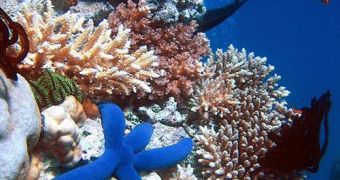In additional to actual pollution, noise pollution is one of the main factors triggering biodiversity loss in the world's oceans. Over the past couple of decades, the amount of noises that permeate the global waters has increased several times over, and marine animals that rely on sounds for communications and other actions are severely affected. Whales are a prime example of this. Many scientists believe that sound pollution is the main reason why the creatures lose their bearings, and then come on shore, only to find their deaths.
Now, a team of British investigators working in Australia, along the Great Barrier Reef, has determined that the increasing amount of sound pollution is having a devastating effect on fish populations. One of the primary consequences is that the marine animals seem to be deserting the good habitats they once occupied. As this happens, they wonder off into the deep sea, where they inevitably die off. The reason for this is the fact that some of these fish species, for example, adapted to their current environments for millions of years.
They cannot possibly adapt to other habitats within a few decades, says the team. Researchers give the example of the baby tropical fish. When ready to move, the creature is heavily reliant on the natural noises the oceans make in order to find coral reefs. It's only here that this animal can survive, but human-produced noise pollution makes reaching the reefs more difficult than ever. During their investigations, the experts determined that even short-term exposures to random sounds were sufficient to attract the fish away from their real destination.
“When only a few weeks old, baby reef fish face a monumental challenge in locating and choosing suitable habitat. Reef noise gives them vital information, but if they can learn, remember and become attracted towards the wrong sounds, we might be leading them in all the wrong directions,” says Bristol University School of Biological Sciences senior researcher Dr Steve Simpson. The new study also shows that fish “can discriminate between sounds and, based on their experience, become attracted to sounds which might really mess up their behavior on the most important night of their life,” he adds.
“Anthropogenic noise has increased dramatically in recent years, with small boats, shipping, drilling, pile driving and seismic testing now sometimes drowning out the natural sounds of fish and snapping shrimps. If fish accidentally learn to follow the wrong sounds, they could end up stuck next to a construction site or follow a ship back out to sea,” Simpson says.
The most common sources for sound pollution in the world's oceans are noises produced by oil prospecting, wind farms and ships. The new investigation is detailed in the latest issue of the esteemed scientific journal Behavioral Ecology. The group that carried it out worked based out of the Lizard Island Research Station in Australia, and was funded by grant money from the UK Natural Environment Research Council and the Australian Institute of Marine Science.

 14 DAY TRIAL //
14 DAY TRIAL //